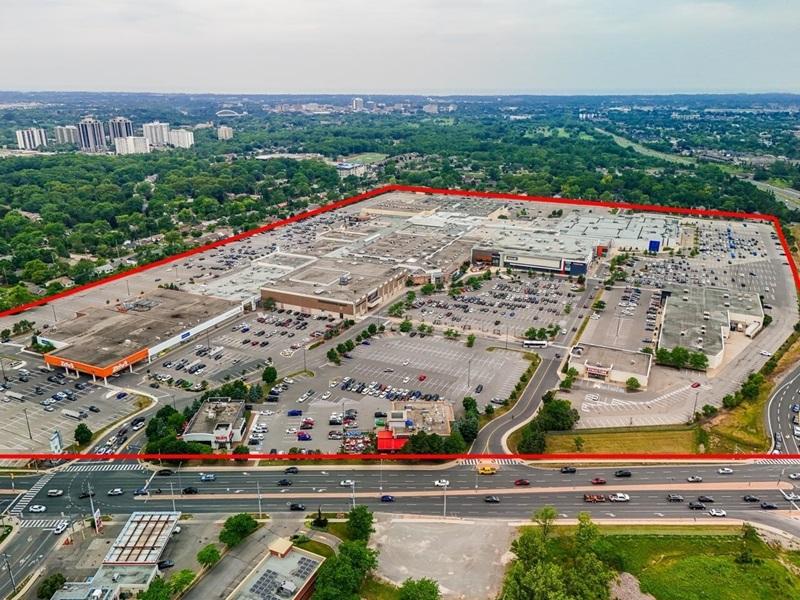
Blair Welch is a co-founding partner of Slate Asset Management. (Courtesy Slate)
Slate Asset Management co-founding partner Blair Welch believes the firm’s acquisition of New York-based Annaly Capital Management’s commercial real estate credit business and portfolio will open up new post-pandemic opportunities.
The transaction is valued at about $2.9 billion (all figures Cdn). Annaly’s CRE portfolio includes $1.2 billion in equity and $1.7 billion in financing, including real estate loans and debt securities, according to its 2020 year-end financial report.
Welch told RENX Annaly’s financing business is the key to the acquisition and will open up significant new possibilities in the United States.
“The acquisition of Annaly’s credit business is something we are excited about,” he said. “Being able to provide capital to good borrowers and good assets coming out of COVID, when people will need it, we’re really excited about that.
“And we’re excited about the assets we were able to acquire, including the team that comes over with a great track record. We’re really excited about the transaction.”
Annaly execs add expertise to Slate’s team
Annaly executives involved with the real estate business will join Slate as part of the acquisition, including head of commercial real estate Timothy Gallagher, and Michael Quinn, its head of commercial investments.
“I think we can look at different parts of the capital stack for real estate assets, so I think in that way it does open a new business line,” Welch said. “That’s another reason why we are really happy to have the Annaly team come over.
“Their expertise and knowledge coupled with ours is going to be extremely powerful so when we come into situations post-COVID we can look at it through an owner’s lens, a lender’s lens and I think we can provide creative solutions for sponsors and borrowers.”
This is in line with an initiative Slate announced last year in Canada, planning to provide up to about $630 million in liquidity through a “special situations initiative” in response to the pandemic. As part of this program, it provided a $75 million credit facility to InnVest Hotels LP, the largest owner and operator of hotels in Canada.
“This transaction really highlights how we believe in the special situations platform,” Welch said.
“The more deals you see and the more information you have I think really helps you underwrite better. From a Slate Asset Management perspective, we benefit from seeing deals globally, from the equity side and from the debt side.
“We can use all the deals we see in the U.S., and some of the hot buttons for borrowers and investors and say to the Canadian team, ‘We are seeing this, does that help you?’ It’s more about the intellectual crossover.”
Grocery assets are “food logistics”
The other key is Annaly’s grocery-anchored shopping properties. They comprise about $490 million of the property portfolio and will be acquired by Slate Grocery REIT (SGR-UN-T). That’s already an area of specialty for the trust and will significantly expand its scope in the U.S.
Slate considers grocery-anchored centres a separate class from other retail.
“We started buying grocery-anchored real estate in a big way in the financial crisis and I think we always looked at grocery-anchored real estate as food logistics, rather than a retail play,” Welch explained. “In the pandemic it’s really proven the local food store, or the spoke in the hub, is just as valuable as the hub itself.”
Despite an increase in online grocery shopping (to about 10 per cent in the U.S.), people are still going to the stores. Or, at least, (are) getting their products from the local stores. Again, think “food logistics.”
“That (10 per cent bought online) means 90 per cent is done in store,” Welch observed. “Now, here’s the interesting thing. Over 90 per cent – probably closer to 95 per cent – of the online sales are done at the local store.
“So what we are saying is over 99 per cent of all the sales are done at the local stores, whether it is click and collect, or someone delivers. You are not changing the distribution pattern.”
He likened local grocery stores to the type of model Amazon wants to achieve. And Welch is a big believer in Amazon.
Grocery stores the last mile in distribution
“Amazon’s whole goal is to get closer to the consumer. A grocery store, if you use a Canadian context, if I am in downtown Toronto and I want to get my groceries delivered, they are not going to the Oshawa or Pickering warehouse to fulfill my order and driving it back.
“I’m going back to my local store where the distribution chain is, because last-mile distribution is the most expensive mile for any product.”
On a financial level, Welch said rents for grocery stores in most markets are comparable to or less than top-quality industrial distribution space.
“If I’m Kroger or Walmart if I have to pay $10 (per square foot) for my warehouse what’s the difference if I’m paying $10 for my store? It’s the same cost, they just look at it as a distribution cost,” he said.
However, those stores are in the middle of most neighbourhoods. Exactly where Amazon wants to be.
“I think Amazon is an amazing company. I think their acquisition of Whole Foods and others is actually to get closer to the consumer. And the Whole Foods (acquisition) was just under 400 grocery stores in a market of 35,000 stores.
“If I am Walmart with 5,000 stores or Kroger with about the same under different banners, that infrastructure is extremely valuable.”
Slate will soon own more of it.
Slate remains active looking for acquisitions
Looking ahead, Welch said even an acquisition of this size won’t force the firm to take a break from other potential acquisitions. He said having the Annaly team to run the financial operation and moving the grocery assets into Slate Grocery REIT’s infrastructure eases the integration.
“The people we are bringing over can manage and take care of what’s there, so it’s not necessarily a huge drain because we are buying the whole platform,” Welch explained.
The grocery assets are “extremely scalable for us. We are not bogged down by the integration there either.”
Welch said this deal shows the firm can move quickly when an opportunity presents itself. And he believes the pandemic will lead to more opportunities.
Bottom line: Slate is still open to new acquisition opportunities.
“We always look at deals.”










